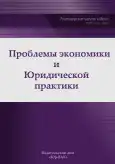Countering corruption in the construction industry
- Authors: Mikhalkova A.A.1, Kashirskaya L.V.2, Zurnadzhyants Y.A.3
-
Affiliations:
- State Government Institution of the City of Moscow Center for Financial Support of the Department of Education and Science of the City of Moscow
- Financial University under the Government of the Russian Federation
- Astrakhan State Medical University
- Issue: Vol 19, No 5 (2023)
- Pages: 292-297
- Section: Regional and Sectoral Economics
- URL: https://journal-vniispk.ru/2541-8025/article/view/252639
- EDN: https://elibrary.ru/QSCRWK
- ID: 252639
Cite item
Abstract
A task. Theoretical and practical aspects of the corruption component in legal relations between organizations of the construction industry arising in the course of activity, as well as in the course of interaction with public authorities and institutions are considered.
Methods. The research methods were chosen in accordance with the tasks set. Among the general scientific research methods, the methods of scientific abstraction, analysis and synthesis, deduction, induction and abduction, scientific classification are used in the work.
Conclusions. It is concluded that combating corruption in the construction industry requires joint efforts of the state, society and business. Corruption is a serious obstacle to the development of the industry and society as a whole, therefore its effective counteraction is necessary to ensure the positive dynamics of construction development.
Practical significance. The practical significance of the article is that the conclusions and proposals are aimed at strengthening the emphasis in the field of anti-corruption.
Originality. The study conducted by the authors revealed the need for a comprehensive, systematic analysis of the problems associated with corruption in the construction industry.
Keywords
Full Text
##article.viewOnOriginalSite##About the authors
Anastasia A. Mikhalkova
State Government Institution of the City of Moscow Center for Financial Support of the Department of Education and Science of the City of Moscow
Author for correspondence.
Email: a_alekseevna99@list.ru
SPIN-code: 1774-8444
economist
Russian Federation, MoscowLiudmila V. Kashirskaya
Financial University under the Government of the Russian Federation
Email: kashirskaya76@mail.ru
ORCID iD: 0000-0002-0234-0223
SPIN-code: 7524-1980
Scopus Author ID: 57210969400
ResearcherId: Q-1289-2017
Dr. Sci. (Econ.), Associate Professor, Professor of the Audit and Corporate Reporting Department
Russian Federation, MoscowYulia A. Zurnadzhyants
Astrakhan State Medical University
Email: julia.zur@yandex.ru
ORCID iD: 0000-0002-7820-9918
SPIN-code: 3015-7800
Cand. Sci. (Econ.), Associate Professor, Associate Professor of Department of economics and health care management with postgraduate course
Russian Federation, AstrakhanReferences
- Corporate misconduct—individual consequences Global enforcement focuses the spotlight on executive integrity. 14th Global Fraud Survey – EYGM Limited, 2016. // PricewaterhouseCoopers Official Website. —Electron. dan. —2019. —URL: https://fraudsurveys.ey.com/media/1576/ey-global-fraud-survey-final-040816.pdf.
- The consequences of weak competition: quantitative assessments and conclusions for policy: an expert and analytical report / [Shastitko A. E. et al.]; Russian Academy of Economics and Public Services under the President of the Russian Federation.—M.: Delo, 2013; Krylova, D. V. Assessment of the costs of obtaining state and municipal services required for the construction of an apartment building: WP8 preprint/2011/08 / D.V. Krylova, S.M. Plaksin; Nats. research. un-t «Higher School of Economics».—M.: Publishing House of the Higher School of Economics, 2011.; Olkhovskaya U. Features of national construction. // Expert Siberia. 2012. № 2-4 (317).
- «Criminal Code of the Russian Federation» dated 13.06.1996 No. 63-FZ (as amended on 28.04.2023). [Electronic resource]: access mode—http://www.consultant.ru/document/cons_doc_LAW_10699/1d89a92f11ffc5fd1f9e111176b14356886d4805.
- Decree of the President of the Russian Federation of August 16, 2021. No. 478 «On the National Anti-Corruption Plan for 2021-2024» GARANT.RU // [electronic resource].
- Federal Law No. 273-FZ dated 25.12.2008 «On Combating Corruption» (current version) [electronic resource] Access mode http://www.consultant.ru/document/cons_doc_LAW_82959.
- Shamsudinov I.U. The problem of corruption and methods of combating it in modern Russia: is the solution close? // Young scientist. —2015. —No.15. —PP. 370–373. —URL https://moluch.ru/archive/119/32764.
- Borshchev A.N. Report «And again about corruption» [Electronic source]. Access mode: http://borshev-a-n.livejournal.com.
- Nabugornova V.N. isks in the activities of small and medium-sized businesses and ways to minimize them // Young scientist. —2015. —No.11.3. —pp. 60–63.
- Corporate semiconductor—individual consequences Global enforcement focuses the spotlight on executive integrity. 14th Global Fraud Survey– EYGM Limited, 2016. // PricewaterhouseCoopers Official Website. —Electron. dan. —2019. —URL: https://fraudsurveys.ey.com/media/1576/ey-global-fraud-survey-final-040816.pdf.
- Fighting corruption and bribery in the construction industry. Engineering and construction sector analysis of PwC's // Global Economic Crime Survey 2014. —PricewaterhouseCoopers LLP, 2014. // PricewaterhouseCoopers official website. —Electron. dan. —2019. —URL: https://www.pwc.com/gx/en/economic-crime-survey/assets/economic-crime-survey-2014—construction.pdf.
- Belousov V.E., Komleva I.V., Potsebneva I.V. Models of tender risk management of a project organization // Bulletin of the Voronezh State Technical University. 2011. Vol. 7. No. 8. pp. 194–198.
- Cherkasov V.V. Problems of risk in management activity—2. ed., reprint. and additional M.: Publishing house «Refl-book»; Kiev: Publishing house «Vakler», 2002 (PPP Type. Science).
- Urban Planning Code of the Russian Federation [Electronic resource]: federal. the law of 29 Dec. 2004 No. 190-FZ (ed. of 25 Dec. 2018).
- The Labor Code of the Russian Federation [Electronic resource]: federal. the law of 30 Dec. 2001 No. 197-FZ.
Supplementary files









